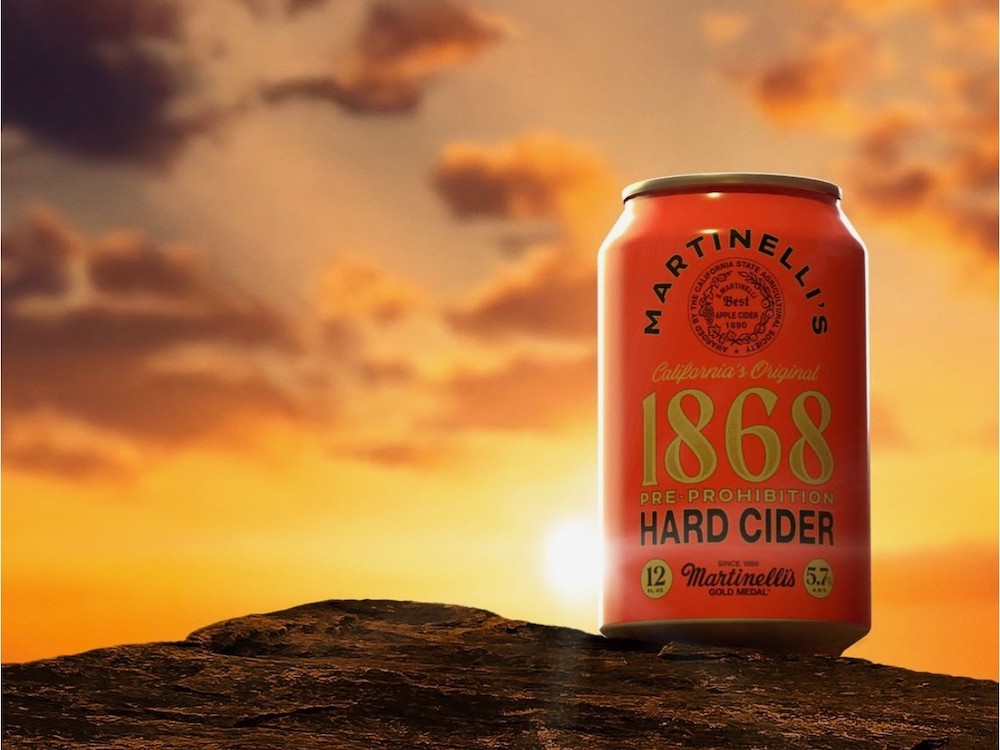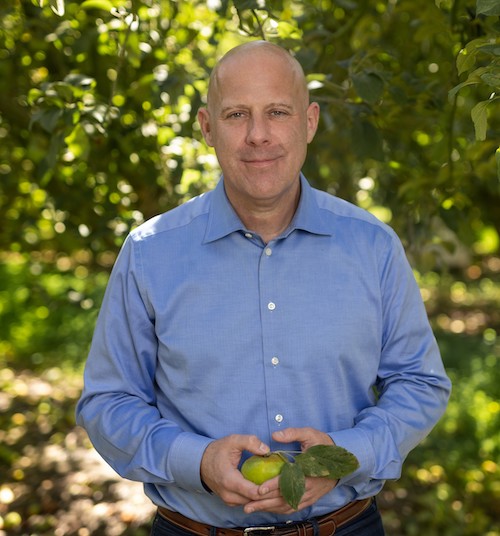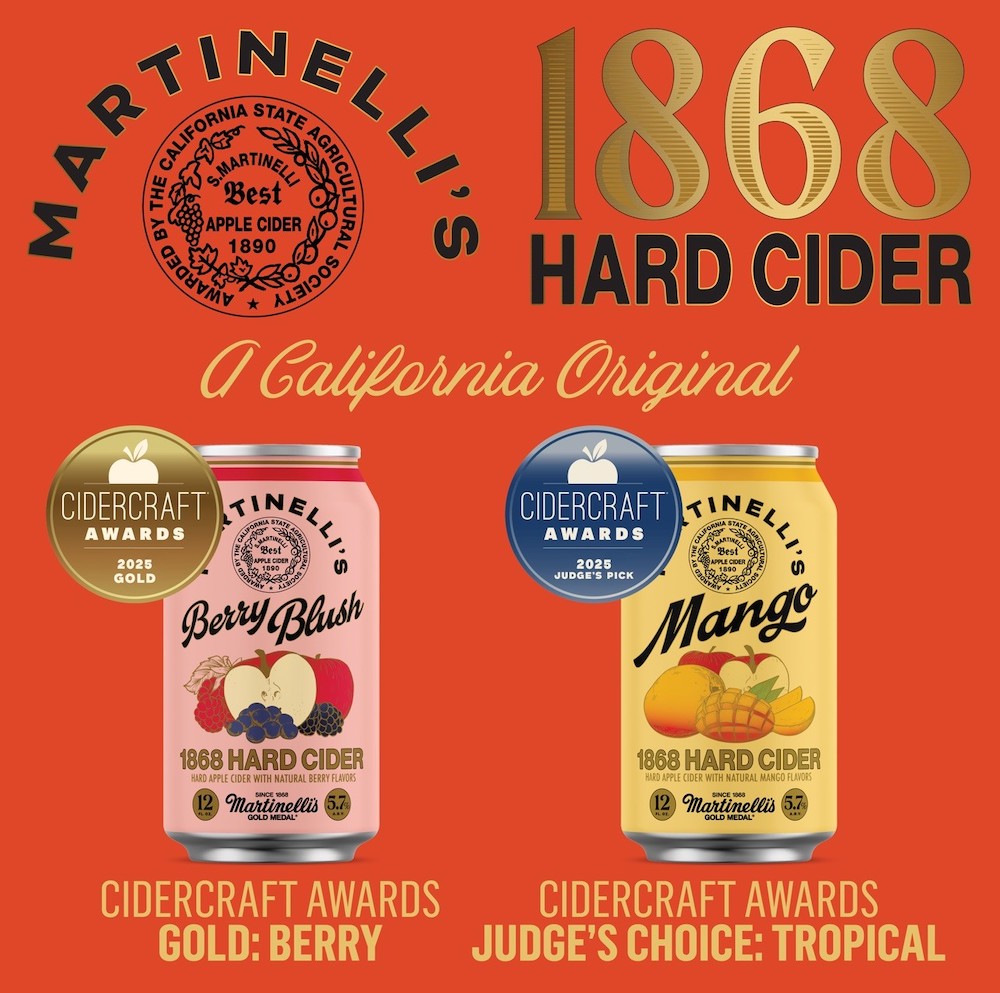
Martinelli’s award-winning sparkling ciders have long been a staple at celebrations of all kinds, with the bubbly beverage adding a festive yet non-alcoholic flair to holidays, graduations, weddings and other events for millions of happy customers.
Yet what most people don’t know is that the Watsonville company, now the biggest worldwide seller of sparkling apple cider, got its start making hard ciders in the mid-1800s.
Swiss immigrants Louis and Stephen Martinelli came to the Pajaro Valley not long after the California Gold Rush and found the climate and soil to be ideal for apple farming. The brothers also realized that hard cider would be an ideal side business. Stephen, using his expertise from Champagne-making in France, created a unique beverage that quickly gained popularity throughout the Central Coast.
But in 1917, when it became obvious that Prohibition would soon descend upon their business, the Martinelli family pivoted to making and selling a pasteurized non-alcoholic cider.
The company’s hard cider made a return in 1933 when the 21st Amendment put an end to Prohibition and made the sale and distribution of alcoholic beverages legal again.
In the mid-1970s, Martinelli’s non-alcoholic sparkling cider and still apple juice became such big business that the Company stopped making Hard Cider. However, Martinelli’s reintroduced hard cider to help celebrate its 150thanniversary in 2018.

“In 2023, we decided the time was right to bring this fan favorite back for good.” says Martinelli’s president/CEO Gun Ruder, and a deal was struck with Sierra Nevada Brewing Co. to produce Martinelli’s hard ciders as a co-manufacturer.
Last fall, Martinelli’s re-introduced its 1868 hard ciders in three flavors to select stores in Northern California, adding a fourth, Berry Blush, this past April. Now there are plans to stock the 1868 line at establishments in Southern California later this year, Ruder says.
Ruder calls hard cider “an important recognition of our heritage.” The apples are all U.S-grown in the Pajaro Valley and Washington state, and include a blend of Mutsu and Newtown Pippin apples, just like its award winning non-alcoholic ciders.
Shoppers will find four styles available: 1868 Pre-Prohibition, based on the original Martinelli’s family recipe; Imperial 1868, a premium cider with a slightly higher 8% ABV content; and two fruit flavors, Mango and Berry Blush. All are in 12-ounce cans and available in six-packs at select independent and chain stores, including New Leaf, Trader Joe’s, BevMo, Whole Foods, Safeway and Nob Hill Foods/Raley’s; in addition, Costco is offering Martinelli’s 1868 hard cider in 12-packs.
Martinelli’s hard cider can be found on tap at select bars, brewpubs and restaurants throughout the Monterey Bay area, including Woodstock’s Pizza and Rush Inn in Santa Cruz, Brewtopia in Capitola, The Monarch Pub in Pacific Grove, Running Iron Restaurant & Saloon in Carmel Valley, XL Public House in Salinas, Daisy’s Saloon & Liquors in San Juan Bautista, Monterey Fish House and Big Sur Lodge.
So why hard ciders, and why now? Ruder says the boom in craft beers in the past two decades have opened people’s eyes—and taste buds—to different types of libations. The artistry and success of craft beers prompted the rise of craft hard ciders and hard seltzers. Martinelli’s saw an opportunity to get in on the burgeoning fermented cider market by offering a quality product that is also a California original.

“People are looking for different flavors,” says Ruder, now that craft beer has been around for a while. “They are gravitating to fruit profiles and drinks with a little less alcohol. (Ciders) are gluten-free and provide a lighter, more refreshing option to beer.”
And as with its other ciders and juices, Martinelli’s hard ciders are made from freshly pressed U.S.-grown apples with no added sweeteners or artificial flavors, setting their products apart from the rest. The hard ciders benefit from natural carbonization due to the fermentation process. The resulting high-quality beverages have a special appeal to customers seeking California-made ciders crafted from natural ingredients.
The expansion into hard cider is also a way for the company to expand its business into a category that complements its other offerings.
“We’re continuing to build our brand. Hard cider has had a steady, strong market, with consumers who appreciate craftsmanship and quality. We are able to bring our focus on premium quality, access to the most flavorful apple varieties and authentic heritage to provide a best-in-class product,” says Ruder.
For more on Martinelli’s hard ciders: @1868hardcider on Instagram or 1868hardcider.com
About the author
Kathryn McKenzie, who grew up in Santa Cruz and now lives on a Christmas tree farm in north Monterey County, writes about the environment, sustainable living and health for numerous publications and websites. She is the co-author of “Humbled: How California’s Monterey Bay Escaped Industrial Ruin.”
- Kathryn McKenziehttps://www.ediblemontereybay.com/author/kamckenzie/
- Kathryn McKenziehttps://www.ediblemontereybay.com/author/kamckenzie/
- Kathryn McKenziehttps://www.ediblemontereybay.com/author/kamckenzie/
- Kathryn McKenziehttps://www.ediblemontereybay.com/author/kamckenzie/



